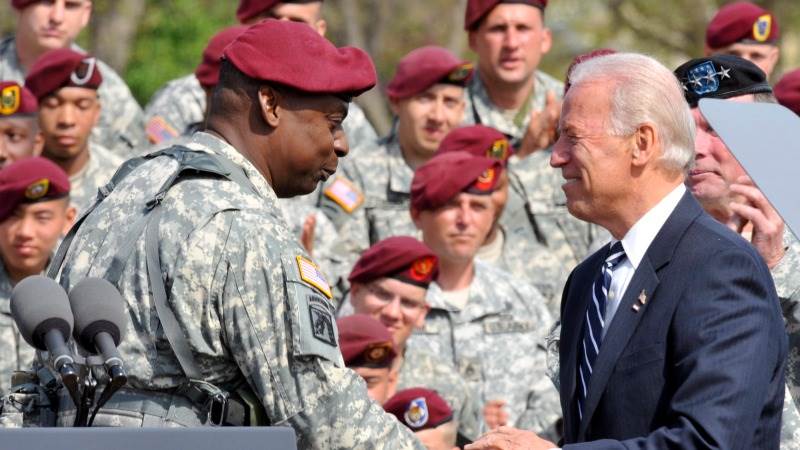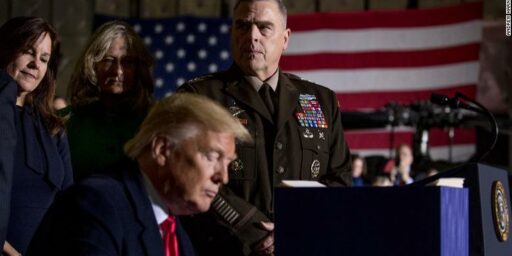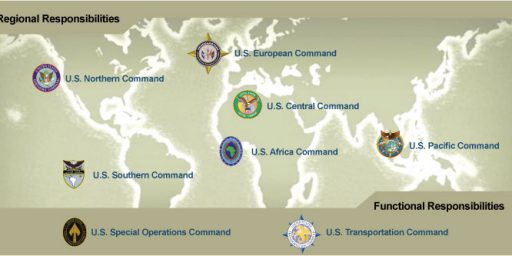No to Austin
My latest for Defense One.

My latest for Defense One, “Congress Should Vote ‘No’ on Austin. It Likely Won’t.” is out. The crux of the piece:
[T]abbing another recently-retired general so close to Mattis’ tenure sends the wrong message. After four years of hollowing out the civilian talent base in the Pentagon, it’s time to restore the balance.
The defense secretary is a civilian policymaker, not a warfighter. Mark Milley, the chairman of the Joint Chiefs, brings decades of uniformed experience to the conversation as do the service chiefs and vice chairman. Likewise, each of the geographic combatant commanders have been steeped in that culture their entire career. We simply don’t need another military man at the table.
More at the link.





I am hoping this will give you a quick chuckle or two when I note that when I went to Politico and saw this headline: Biden picks retired general Lloyd Austin to run Pentagon, for a moment I thought the headline was Biden picks retired general Lloyd Austin to ruin Pentagon.
My eyes quickly adjusted as I am still waking up but I also immediately thought of this post of yours after I read the headline.
James, I can’t believe it took you so long to post this opinion. I have been expecting since the moment I saw the headline.
I agree with your analysis as far as it goes in a universe where all else is equal.
The problem is that all else isn’t equal.
Ideally, it’s better not to have a retired general in this position, but that’s not a determination that exists in isolation and it’s not clear that preference should trump all other considerations in choosing a candidate. Or if it does trump all other considerations, then one ought to make the argument as to why that particular defect is more important than the defects of the alternatives.
As with anything else, one must consider the tradeoffs. Which no one in the professional national security space seems interested in doing.
As noted in previous comments, there is still this strange lack of interest in policy preferences. It’s as if the national security community not only doesn’t care about how the potential picks view national security problems and America’s role in the world, but isn’t even interested enough to take a cursory look.
It’s not clear to me that having a recently retired general is worse than the downsides of the other candidates. Again, all the “analysis” I’ve read about this pick – including yours – does nothing to address this. Instead, there is some hand-waving about the supposed bad effect on civil-military relations and the “message” this pick sends as if those things are self-evident. How, exactly, would picking Austin harm civil-military relations, especially compared to the alternatives? What “message” is actually being sent and what specific effect(s) will that message have?
The deepest take of Austin I’ve seen is still quite shallow – an argument that says US foreign policy will continue to be Middle-East centric because Austin commanded CENTCOM. Well, maybe that is true, but maybe it isn’t. Assertions are not evidence. Again this should be an area to explore.
I’m sorry to sound ranty about this, but the analysis of potential picks for such an important cabinet position ought to have more…well…analysis and substance. I don’t know if Austin will be a good pick or not. I don’t know his policy views. I don’t know about his worldview, his leadership style, or his philosophy on the proper role of the military in foreign policy. I can research all that myself, but it sure would be nice if the professionals who are are supposed to do that kind of work would actually do it.
@Joe: Ha. The news broke around 9pm and I seldom write in the evenings anymore. I wrote this around 5 am but had to wait for them to review and publish.
@Andy: That’s fair enough. The short answer is that it’s really hard to say.
Flournoy has by far the most published writing on military affairs. But she’s been angling for this job for at least a decade now and is therefore extraordinarily bland in her public pronouncements. Indeed, that’s almost certainly why I didn’t find her impressive the handful of times I’ve heard her speak. Everyone who knows her well says she’s brilliant but she’s intentionally banal in public.
Johnson’s Defense experience is as a lawyer–General Counsel fo the Air Force and later DoD. Those are big jobs and I’m confident he knows the Department well. But he’s not a public intellectual. I just have no idea what he thinks.
Duckworth doesn’t strike me as overly bright—but she does have a real deal masters to go along with a mail-order PhD.
Austin, like Johnson, has always been an insider. We just don’t know what his views are because his job was to execute someone else’s policy.
@James Joyner:
Thanks for your additional thoughts.
My main concern with Flournoy is that she appears to be too eager to employ military force for my taste. I understand that many don’t like generals in this position, but my bias is against the long line of civilians who see the military as a tool for almost every FP problem, probably beginning with Sec. Albright and the famous exchange with then CJCS Powell and going through just about every secretary from there. Flourney seems to be very much in that mold.
I wish I knew more about Austin. I’ve done some searches but haven’t found a lot. If you know of any sources, it would be useful if you could post them. My concern with him isn’t so much that he’s a recently retired general, it’s that he’s an unknown in terms of other factors mentioned.
For Johnson, I don’t know a ton about him, but I do apply greater scrutiny for lawyers who jump into top-level executive positions. The skillsets are different. And yeah, I don’t know what he believes in either, which is a problem.
Duckworth doesn’t have the executive and managerial experience in my view. I think she’d be a better fit at the VA anyway since that is where her experience is.
But the choice is ultimately Biden’s (with the consent of the Senate) and, depending on one’s views of Biden, we must trust that he’s making the best choice for his administration.
@Andy:
My personal preference is to have someone in place who understands that force is used judiciously, and has actually been on the sharp end of the stick.
My weak wiki-fu indicates that he has a lot of experience in operations and logistics management. So I don’t know whether he has actual combat experience or is another career admin. That aside, he doesn’t appear to be a glory-seeker, which I’m happy with.
After decades of watching weasels in suits send children to bleed, I’ve long suggested that our fearless leaders should demonstrate their willingness to bleed for their foreign adventures by putting themselves and their children on the first boats to the beach. Civilians often think that force is easy. In fact, it is. The consequences, however, are hard.
Absolutely agree with Duckworth for VA. The troops deserve someone who’s been there, and who cares for them.
Well, we now have it straight from Biden.
@Andy: I’m curious what others make of Biden’s argument. I found it bland and not remotely compelling. Also, if you have to publish in the Atlantic under your own byline to defend your choice you’ve probably make a mistake
@Erik:
I listened to the latest Vox “weeds” podcast while walking the dog this evening which discussed the Austin pick with a couple of progressive analysts. The podcast was recorded before Biden’s Atlantic piece came but a lot of stuff lines up with the focus of Biden’s essay IMO. To summarize their two main arguments for why Austin:
– Since he passed over Rice for NSA (and thank goodness for that), Biden needed a black person. or at least a person of color, in one of the premier cabinet positions. Given that the national security community at high levels isn’t a very diverse place, the list of options wasn’t large. Austin was the most qualified and politically acceptable black candidate for the position.
– Biden is picking people he has a personal rapport with and trusts. He has a rapport with Austin as described in the Atlantic essay, but he doesn’t with Flournoy supposedly. Also, there’s speculation that Flournoy was too much of a policy activist who would focus on promoting her preferred positions. Austin, by contrast, is known as the “invisible general” because he shunned the spotlight as CENTCOM commander. Hence the reason why his policy views are not known. He also wasn’t an advocate, didn’t try to box his superiors in, and didn’t push back hard or leak to the press when his requests from the Obama admin for forces and resources were denied. The gist is that he’s more of a team player.
-Also Biden is the most experienced foreign policy President since George HW Bush by far. Therefore, unlike past Presidents, he doesn’t need an experienced insider steeped in policy to guide him regarding the nuances and pitfalls of national security. Flournoy’s expertise, policy chops, and insider knowledge simply aren’t as important to a Biden administration as they would be for a President with no FP experience.
I think the pick makes a lot more sense now. A big question mark is Austin’s policy views which aren’t really known. But maybe that doesn’t matter if he’s going to be more of an executive focused on implementation and coordination instead policy.
@James Joyner: Executing someone else’s policy is the job of a Cabinet Sec’y James. Esper, Carter, Hagel….all the rest… executed the President’s policy even if it differed from their own.
The value of a Cabinet Secretary is in their ability to efficiently figure out a HOW to get to POTUS’s desired outcome. And along the way communicate the Pro’s and Con’s of the various courses of action the POTUS is considering.
I agree with Andy about the shallowness of the punditry behind these selections but for a different reason–its almost as if people don’t really understand the job they are analyzing candidates for. SECDEF nor any of the other Cabinet Sec’ys are CEOs–they are more like COOs. The things civilians care about that DOD does are 99 times out of 100 going to be downward directed from the White House. Period. Decisions like–how to mitigate a 30 day Carrier gap in “X” region by pulling resources from other areas aren’t things you care about but are the bulk of the types of shots SECDEF is calling.
The big takeaway is that Biden feels comfortable with Austin’s approach to decision making and his ability to react to unforeseen crises which plague every large operation. As I’ve said before–I’ve been in rooms with Austin and he’s good–definitely a thinker. If he had a little more personal charisma he’d be the total package but he’s more of the a Joe Friday–only the fact ma’am type. I fully expect him to have success in the position. In fact, I think he’s probably even a better fit temperament wise than Mattis.
The biggest world view we need to know is how does Biden view the world? Are we going to continue with the Trump NDS which de prioritizes counter-terrorism? Austin isn’t going to be the one to make that call. What Austin is going to have to do is field a Force that can respond to the NDS which I expect to stay the same under Biden as the Trump version. We have the premier counter terrorism force in the World. Russia and China are not terrorist organizations–so Austin will have to make modernization and force alignment decisions to posture DOD to respond to a new threat–WHILE SIMULTANEOUSLY managing the Iran problem as well as keeping the the Jihadis from establishing new bases to launch external ops in Afghanistan and Africa.
Frankly, my take on Flornoy is that she is a policy person and really didn’t get a good deal of breadth within DOD. Knowing policy is great, but not the best fit for the job of SECDEF. Being a policy expert doesn’t help you when you need to decide if you need to accept risk of 60 day carrier gap in the Straits of Hormuz or do you need to tap the Air Force to move a bomber squadron overseas for a short deployment until your carrier is available for its scheduled cruise. Oh, BTW, if you do you’ve accepted risk for whatever missions those bombers are now not available to do. Policy chops don’t help you decide where the big ticket R&D dollars will go to ensure the Force in 2040 is able to compete and win versus the China/Russia of 2040.
Im not saying Austin is a no brainer–but I am saying he has better chops that would enable him to be successful that does Flournoy. And while I am sorry that the Dept still hasn’t had a Woman leading it–I give Biden credit for recognizing the complexity of the job and not putting her forward just to check a block. In the aftermath of this, the Administration should start grooming (non-military) female candidates by getting them the breath they need to understand the Department from more than one angle.
P.S. I also think her Libya position was damning–and frankly didn’t show proper judgement. As much as we’d like to think removing shithead strongmen from the face of the earth is good–its actually naive and causes more damage in the ensuing chaos than letting them stay in power.
@Andy: Pretty good take Andy. As I also mentioned before–Flournoy’s resume appears to be heavy on the policy side. A little one sided for my liking as a Department Head. Even her private sector experience was policy oriented–you need some executive chops to be an effective SECDEF.
Democrats and Liberals, IMO, overvalue policy knowledge (and of course Conservatives and Republicans seem to undervalue it) thinking mastery of it is makes a good leader when, in practice, it doesn’t.
Decision-making is separate talent unto its own. Just because people understand policy and can communicate it–doesn’t mean they understand the science and art of choosing the best of all good options and the best of all bad options. Knowing and articulating policy also doesn’t help one garner the buy-in one needs to move a giant bureaucratic beast in a direction it doesn’t want to do. How many VA Sec’ys were going to fix it and clean out the dead weight that only wanted change after they retired?
We know Austin is a leader (at least, I know it because I’ve been in several briefings with him at head of the table) Is he good enough to get DOD on a good path to nation-state competition again? Major unknown. People that work at the sausage making level have all sorts of thoughts of how the Force should look in 2030 to compete with Russia/China/Iran– Austin will have to make the right bets be on the right side of major tradeoffs or we will loose military advantage against those competitors.
Frankly, it is inevitable as sustained competitive advantage has been fleeting throughout the history of civilizations. Doesn’t mean it has to be on our watch however.
@Jim Brown 32:
Excellent! I think you really hit all the important points – those are two great comments.
I guess we just need to wait and see if Congress will grant the waiver and confirm him.
@Andy: @Jim Brown 32: that is encouraging. Thank you both for the thoughtful replies, and for the Vox podcast tip. It’s first up for my commute tomorrow.